Xige Estate – in China’s northwest wine region, Ningxia – is a young winery which aims to produce fine wines on a massive scale. “Large production of fine wines is the main goal and is the heart and soul of the whole Xige Estate project,” Zhang says.
It has a stunning new winery, opened in May 2019, the most advanced winemaking equipment in China, and ambitious plans.
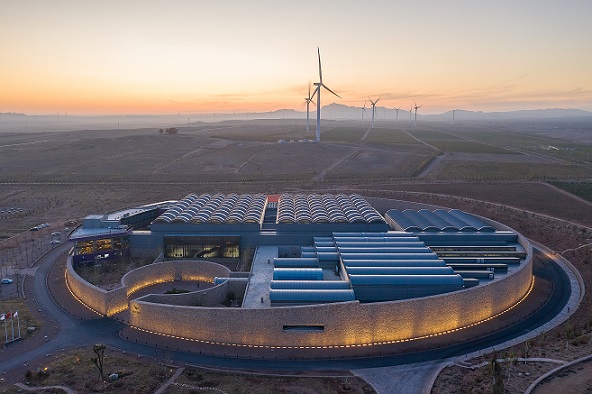
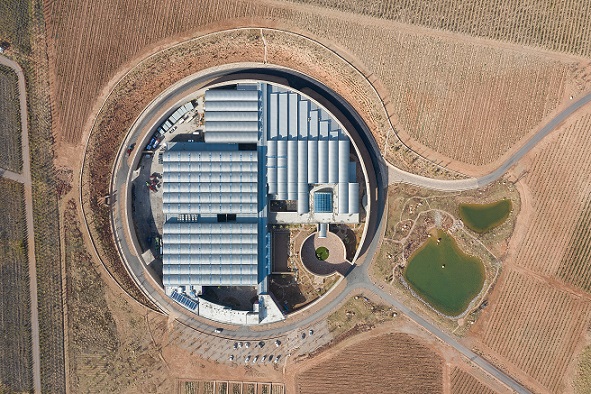
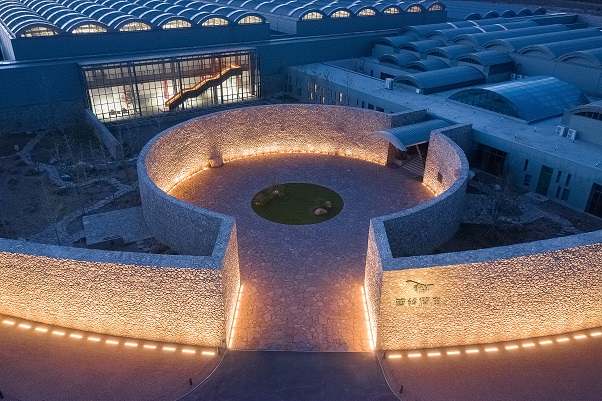
“We have just signed the contract to purchase 1,000 hectares of new land to expand our vineyard, so we will have a total of over 2,300ha of vines with a potential production of 6-7 million bottles in a few years,” Zhang explains. “Only with this information I believe people can see how confident I am regarding the potential development of our wines!”
The bespectacled and well-versed winemaker began as a wine merchant and achieved recognition when his Beijing Easy Cellar sold RMB 20 million ($3m) worth of Penfolds Max series in 2016 within 15 days of its launch in China.
He then purchased some of the oldest vineyards in China, planted more than 20 years ago by the Chinese government, and, two years ago, completed the stunning $44.5m winery at the foothills of Helan Mountains, close to the Gobi Desert.
The winery (above) is surrounded by a circular wall, made from nearly 200,000 rocks from the Helan Mountains, and has a smaller circular wall as the main entrance. The ‘circle’ represents inclusiveness and good faith, while the ‘square’ production facilities within the wall represent “preciseness and pursuit of excellence”.
The 25,000sq m winery, designed with a production capacity of 10 million bottles, includes two production workshops, an oak barrel cellar, a tasting and visitor centre, the Jade Dove Vineyard Boutique Hotel and an organic restaurant.
Within the production facilities is the latest winemaking equipment from France, New Zealand, Germany and Italy, as well as thousands of oak barrels from France.
To monitor the vineyards, a screen in the winery shows real-time data covering soil, light, wind, precipitation, grape growth, and humidity. This information will be matched to the wine samples to aid the entire Ningxia wine region as it continues to develop into a powerhouse for fine wine.
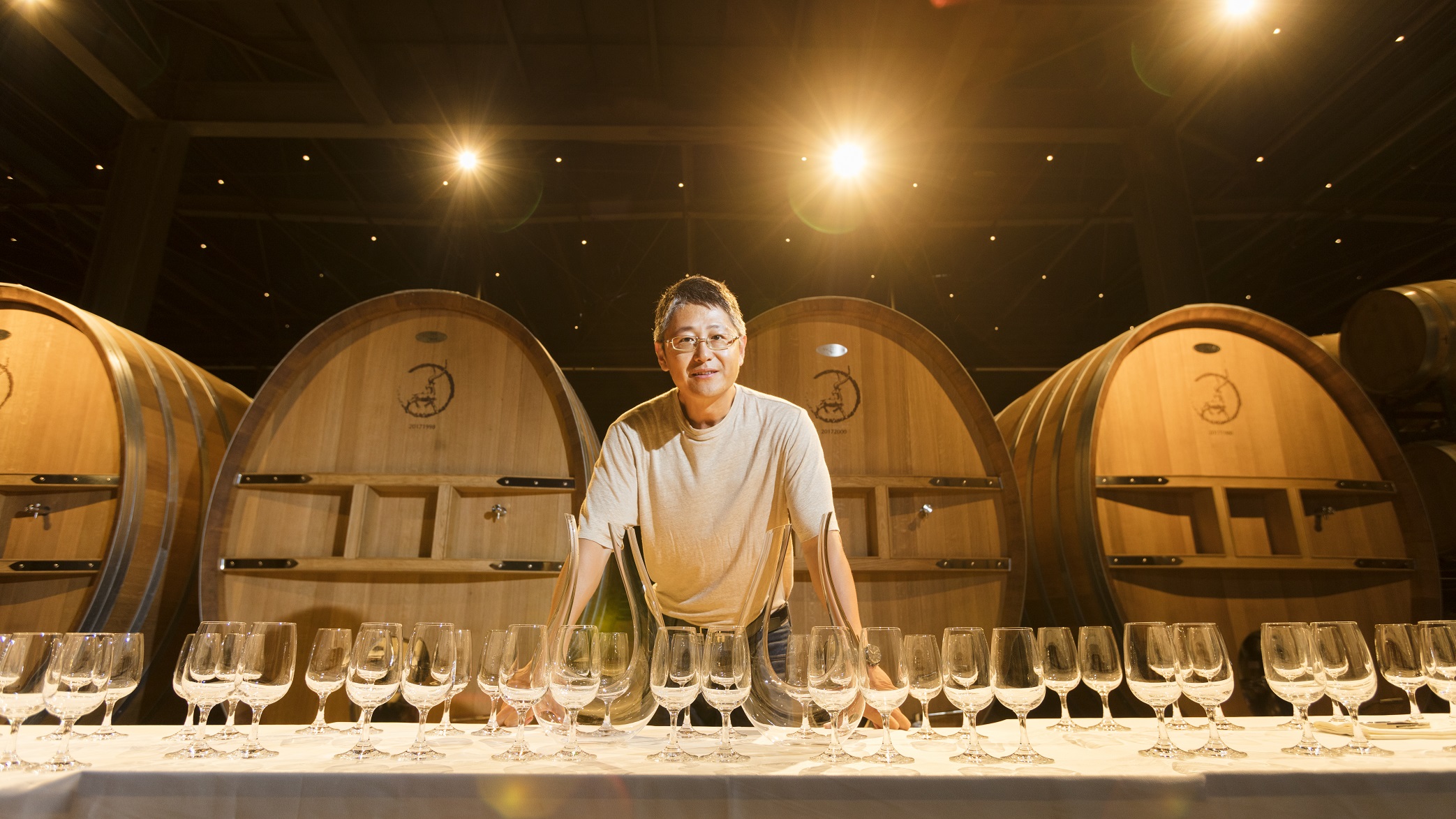
Here’s the full interview with Zhang Yanzhi
‘The fine wine production industry is developing at a very high speed’Canopy: What can China offer the wine world?
Zhang Yanzhi: “China can bring a lot of novelty and diversity in the wine world.
“China is now ranked as the tenth country in terms of wine production worldwide, and fifth in terms of wine consumption, yet it is not well-known worldwide as a wine production country. Most wine professionals and wine lovers don’t even know that China produces wine, so of course China is even less known as a fine wine producing country.
“It is surely because the fine wine regions in China are all very young – with less than 10 to 20 years of development. A real increase of quality wine production has been happening within the last 10 years or so only, and the production per region is still very small with mostly boutique wineries, so even in China it is not very well-known yet by local professionals and consumers, even if we have seen increasing demand and interest in the last year.
“But as anything else in China, the fine wine production industry is developing at a very high speed, especially in some regions, and especially in Ningxia, where it is well supported by local authorities that see the wine industry as one of the key industries to both bring economic and social growth locally, and also support the central government poverty alleviation plan in one of China’s most remote and poorest regions (Ningxia). Last year’s visit of President Xi Jinping in Ningxia has also shown the great support of central government in pushing the development of national and local wine production, in Ningxia because it plays an important role in the ecological development, in the fight against desertification. It brings a lot of more stable jobs too.
'China can offer a great diversity in wines styles'“China has about 10 wine regions that are spread all over a very large country, with vine-growing areas spread around very large spaces within one region too, with also different local terroir conditions and many mesoclimates. So, with all these very different soils, climate conditions, China can offer a great diversity in wine styles: from costal Shandong, the historical wine-producing area in China with high rainfall and monsoons, to inland wine regions like Ningxia where vineyards are spread at the foothills of the Helan Mountains in extremely continental, semi-arid, high-altitude climate conditions.
“Most of China’s wine regions offer quite challenging conditions for vine-growing and winemaking though, which I think also makes it even more exciting and gives the wines and brands even more identity and things to talk about while doing promotion both inside and outside the Chinese market. And I think this can attract many worldwide wine lovers’ curiosity into discovering new regions and wines they have never tried or heard about before, especially since the quality is there, too, to satisfy sophisticated wine lovers!”
What can Xige Estate add?
Zhang: “Talking only about the national market, which of course is the main market for any Chinese wine producer, in a country of 1.5 billion people with average wine consumption still about 1.5L only per capita, the potential of growth for wine consumption is huge. Global wine reports predict that China will become the second largest wine consumption market after the US within the next few years (between 2022-2024). But the Chinese quality wine regions that have been developing for the last 10 years or so are carrying mostly boutique wineries that are producing only a few thousands to few hundred-thousands bottles annually...
“And it is hard for small wineries to build a real distribution network from scratch, to build brands and promote them, either because they don’t have the sales and/or marketing experience (many boutique winery owners in China don’t come from the industry), or because they don’t have enough volume available to actually be able or willing to invest on marketing and promotion. So Chinese quality wines are still very difficult to find on the Chinese market and usually are offered at quite high prices. Since consumers don’t really know much about those pricey Chinese wines, they are very sceptical in buying them, or they just don’t know where to buy them.
'My winery offers a great option for wine lovers in China who used to turn to imported wines'“I believe that Xige offers a great opportunity of development for the quality Chinese wine industry and market with a large production scale of fine wine that will be able to supply the growing wine demand on the national market. And my winery offers also a great option for wine lovers in China who used to turn to imported wines when looking for fine wine because they didn’t know that China can also make high quality wine. So, I believe, we are also bringing more diversity to the market.
“We were able and willing to make such a great project happen because we already have experience selling large volume of fine wine and building brands in China thanks to my other company, Beijing Easy Cellar, which has been importing wine since 2010 and with which we have had great success on the Chinese market, building strong imported wine brands over the last five years. So, we already have a few hundred distributors working closely with us everywhere in China, we have developed many wine distribution channels, and we have an experienced team of sales and marketing people, an experienced vineyard and winemaking team in place who has been working with me on my earliest boutique winery project in Ningxia, Guanlan, since 2012.
“And it is thanks to all of that that we have been able to sell over 1 million bottles of our first vintage (2017) in just over one year, even under very troubling Covid-19 times, which I believe is quite unique for a Chinese Wine producer offering exclusively fine wines that are sold from over 100 to about 500 yuan a bottle retail ($15-$77).”
‘I am very confident that Xige Estate will be leading the Chinese wine industry towards a great bright future’How far can you go with this estate?
Zhang: “I believe that we are on the right track, and that the timing is right too for the Chinese fine wine industry to speed up its development as there is an increase in demand and interest right now for nationally produced wines, and overall an increase in consumption of wine in China, especially fine wines, so we will keep on developing. We have just signed the contract to purchase 1,000ha of new land to expand our vineyard, so we will have a total of over 2,300ha of vines with a potential production of 6-7 million bottles in a few years. Only with this information I believe people can see how confident I am regarding the potential of development of our wines!
“I believe this is just the beginning of a new trend on the Chinese wine market and wine industry and I am very confident in the fact that Xige Estate will be leading the Chinese wine industry towards a great bright future and put China and Ningxia on the world wine map.
“We will also keep on developing our wine tourism project since we are also having great success with that since the opening of the winery. China tourism industry is also booming, with increasing wine consumption, a lot of Chinese wine lovers want to visit wineries and vineyards, and explore a new lifestyle away from big crowded cities. With the recent Covid-19 pandemic, millions of Chinese tourists can’t go abroad so they will be looking at national options instead, and Xige offers a great wine tourism experience with high-end boutique hotel and restaurant, and a dedicated team to take them on a tour and taste our wines. Wine tourism is also a great tool to develop brand awareness and wine sales. We have already had a great year in 2020 with our visitor centre, hotel and restaurant fully booked during the whole touristic season in Ningxia from May to October.
“So I do believe that we can go pretty far in many aspects of the wine industry, how far exactly only time will tell us but we are here to stay and for the long run obviously!”
What export markets are you targeting?
Zhang: “Xige Estate is aiming to build an international brand so export is also very important for us, that’s the reason why we have recruited at the early stage of the project a French national as international affairs director, Christelle Chene, who is also in charge of export sales and marketing among other things.
“We have already started exporting our wines to international markets such as Canada (Ontario and Québec), Switzerland, Hong Kong and Macao, and we are currently discussing cooperation with importers from many other countries in the world. We are very excited to see so many people interested in discovering our wines, feeling surprised and loving them when they taste them, and willing to work with us abroad to build our reputation and distribution.
“We will be focusing our efforts in the next few years on markets that seem to offer the best potential for development, such as North America, Japan, Korea, South East Asia and UK mostly, but of course we are aiming to find partners all around the world, it is just a question of time. We are a very young winery that has only opened in May 2019, we are still building our team which takes time.”
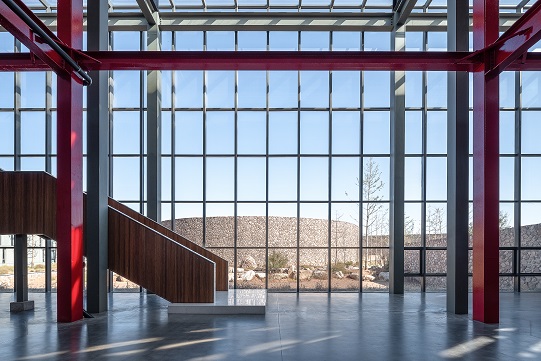
Can fine wines and large production capacity go hand in hand?
Zhang: “We surely believe so. Large production of fine wines is the main goal and is the heart and soul of the whole Xige Estate project. This is why we have invested so much in vineyard management, in vineyard restructuring after we have taken over the 1,000ha of ‘old vines’, and in the high-end winemaking equipment, to make sure that while producing large volumes, we could also guarantee the high quality and stability of all our wines.
“As you will see in our advanced equipment list and description (see part 2 of our interview in Canopy’s next issue), we have thought of all the details and made all of the necessary investment and efforts to achieve our goal of making great wines with large volume in Ningxia. It is not difficult to produce 10,000 or 100,000 bottles of fine wines without world-class equipment and counting only on ‘manpower’, but such equipment becomes necessary when you are aiming at producing millions of bottles of high-quality wines.
“Those pieces of equipment are also a big help in increasing production efficiency and decreasing the cost of production so we can offer better price-quality ratio products. We have less than 30 persons working on the production department under our chief winemaker (Liao Zusong), which includes the whole production process: winemaking, bottling, logistics and supply chain, for an annual production of a few million bottles.
“It is also important to know that thanks to all the investment and dedication, we are the first and only Chinese wine producer to have passed the BRC Global Standard for Food Safety certification. It shows our dedication in aiming for the best quality production standards.
“We also need to keep on developing new techniques, new technology and new methods in the vineyard and the cellar, and Xige, thanks to its large scale and capacity of investment, is also very much invested in that and is a leader in the region and in China, working with many national and international experts, oenology and vine growing schools, etc. The work and the experiments that we are doing now will benefit everyone in the wine industry in China in the future.”
In part 2, Zhang discusses Xige Estate’s ‘biggest strength’, their bestseller in China, ‘smart agriculture’ and their ‘state-of-the-art’ equipment.
Click here to see Xige Estate's results in IWC 2020.


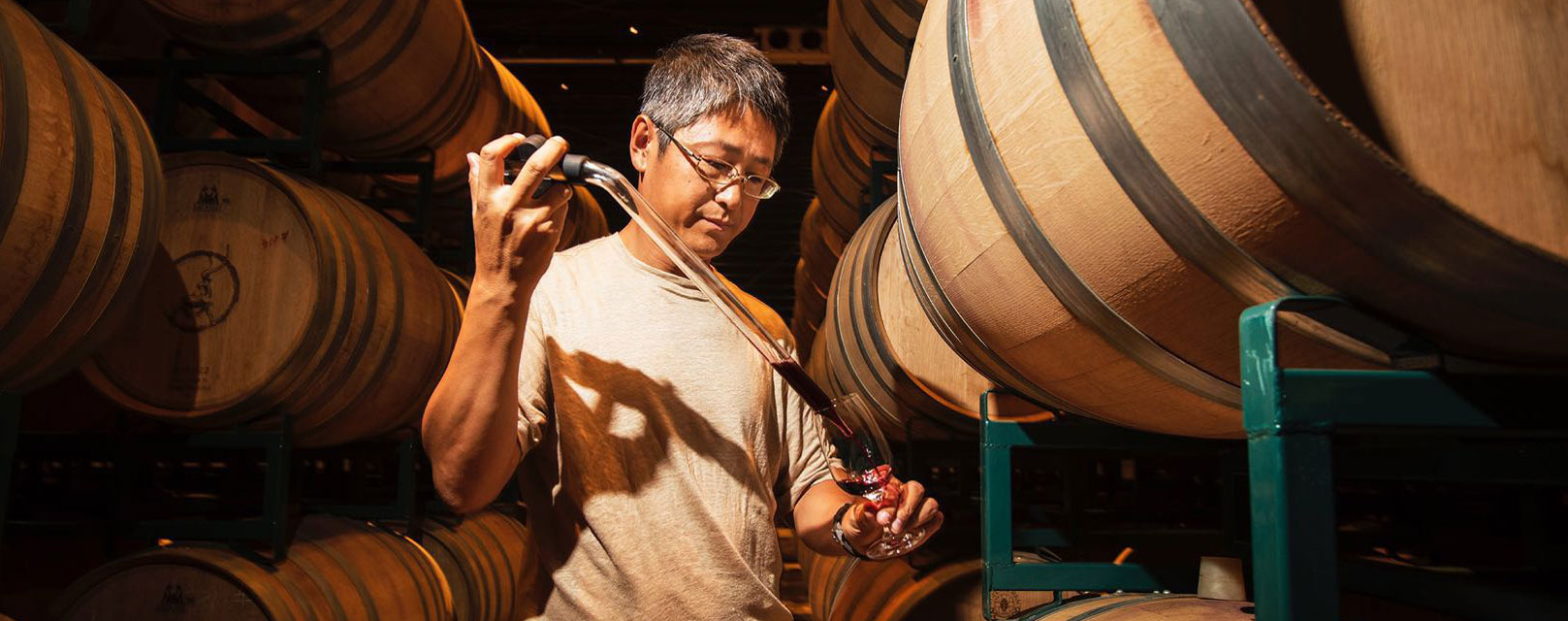








.png)









